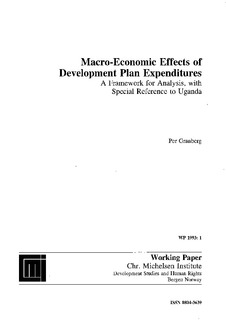| dc.contributor.author | Granberg, Per | |
| dc.date.accessioned | 2008-03-12T11:09:46Z | |
| dc.date.accessioned | 2017-03-29T09:12:42Z | |
| dc.date.available | 2008-03-12T11:09:46Z | |
| dc.date.available | 2017-03-29T09:12:42Z | |
| dc.date.issued | 1993 | |
| dc.identifier.issn | 0804-3639 | |
| dc.identifier.uri | http://hdl.handle.net/11250/2435908 | |
| dc.description.abstract | Development plans are mainly concerned with the financial aspects of development projects, while the economic aspects are often neglected. This paper constructs a methodology for converting the information given in development plans into data suitable for a real-economy model. The method deals with backward linkages in terms of the demands by the projects for products and services from the rest of the economy; and forward linkages in terms of benefits the project is expected to generate and its future demands on public budgets for operation and maintenance. The paper is focusing on Uganda as a case, while the overall aim is to illustrate general principles. | |
| dc.language.iso | eng | |
| dc.publisher | Chr. Michelsen Institute | |
| dc.relation.ispartofseries | CMI Working paper | |
| dc.relation.ispartofseries | WP 1993: 1 | |
| dc.subject | Development plans | |
| dc.subject | Economic models | |
| dc.subject | Development projects | |
| dc.subject | Uganda | |
| dc.title | Macro-Economic Effects of Development Plan Expenditures. A Framework for Analysis, with Special Reference to Uganda | |
| dc.type | Working paper | |
